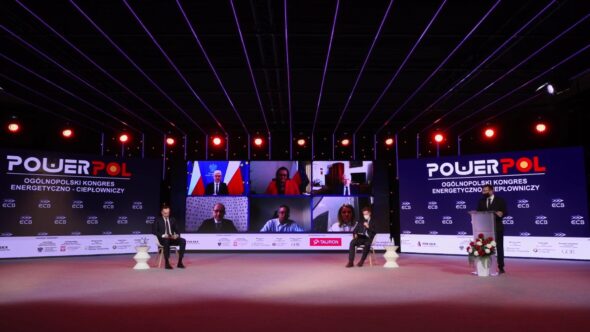So what Poland has an energy strategy if it so vulnerable to pressure from various interest groups that it could be changed at any moment. The bickering in the United Right is disorganizing the state policy on power – writes Wojciech Jakóbik, editor in chief at BiznesAlert.pl.
The POWERPOL 2021 conference offered an opportunity to verify the government’s energy plans. Piotr Naimski, the Government Plenipotentiary for Strategic Energy Infrastrcuture, defended the government’s energy strategy against criticism from Janusz Kowalski, the recently removed Deputy Minister of State Assets who calls for defending coal against climate policy, and against other discussion participants that demanded that the policy be implemented through a quicker coal phase out.
Naimski admitted that Poland would not receive half of the subsidies that were awarded to her as part of the Just Transition Fund, because Warsaw did not support the EU 2050 climate neutrality target. Until now the government has been suggesting that it would negotiate the size of that support in return for backing the target. It looks like minister Naimski solved that dilemma.
This means Poland will receive less EU funds and its energy strategy will undergo new modifications. Despite that, the government is to soon present a list of projects that are to receive EU funding from various support mechanisms, including the Recovery Package. The list will be included in the National Recovery Plan, which is to be sent for public consultations. However, it remains unclear whether we will know which projects should be a priority, and thus receive the biggest support.
Minister Naimski, as always, warned against overinvesting in gas, which could lead to over-reliance on import. He admitted that the floating regasification unit or units (new info!) in the Bay of Gdańsk will provide a safeguard against the necessity to purchase Russian gas. It will be possible to adjust their capacity to the demand on the market. Whereas Igor Wasilewski the Chairman of the Management Board of PERN S.A. (oil transmission network operator), warned that the expansion of the Pomerania oil pipeline will be possible only after the merger of Orlen and Lotos, as they are the main clients that use the infrastructure between the refineries in Płock and Gdańsk. It is no secret that the merger is a bone of contention between some factions of the United Right.
The plenipotentiary also had to respond to the critics of the nuclear project. He ensured it was possible to build the nuclear plant on time and in line with the budget, which fuelled speculations about the participation of Koreans from KHNP, who successfully completed a project of this type in the United Arab Emirates. However, when I asked him whether either of the potential suppliers, be it from the U.S., Korea or France was leading the race from Warsaw’s point of view, he replied that thanks to our strategic partnership with America by the end of the year we would receive an offer from U.S. companies and the American government about the technology and financing model, but added that the other providers were still in the game. Perhaps this means some offers will be combined, and a nuclear tandem, or even a trio will be established where companies from a few states will participate. I wrote about this a few years ago.
I asked the Deputy Climate and Environment Minister Ireneusz Zyska whether the Polish Energy Policy by 2040, which proposes that coal be gradually replaced with nuclear power, natural gas and renewables, could be revised after the talks with coal trade unions. „Let’s not get attached to a piece of paper,” the minister replied. In his opinion, it is possible that the document would be updated before the official review that is to take place in 2023. However, he also explained that the so-called clean coal technologies advocated for by the trade unions would not be added to the policy. Still, the truth is that the draft social agreement proposed by the Prime Minister is being questioned by trade unions, Law and Justice MPs from Silesia, the United Poland and other, smaller factions that have impact on the government.
It turns out that the only permanent things in Poland’s energy policy are the Baltic Pipe and the dispute over the energy strategy. This disagreement was not solved even by the fact that the government had already adopted the document, and it will continue to unfold during the talks on the social contract with coal miners. Poles will receive less EU subsidies for the transition of post-mining regions, and it is uncertain what they got in return. Nobody knows which projects will be promoted, because the list is still being drafted. If we add to this situation the internal disputes in the United Right, symbolized by the removal of Janusz Kowalski from the State Assets Ministry, the picture we get is of a disorganized energy policy, which causes an inertia that is unacceptable during a time when the most important decisions about the sector need to be made.









